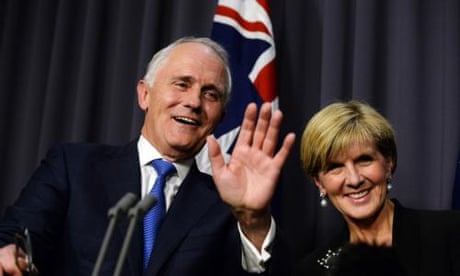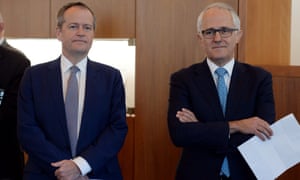Extract from The Guardian
For the experiment in ending zero-sum warrior
politics to succeed, disagreement and scrutiny must be conducted as
debate, not screaming match
If Turnbull can take the punch out of politics it
will help other politicians too – including the ones with whom his
critics concur. Photograph: Sam Mooy/AAP
Contact author
Friday 18 September 2015 19.57 AEST
Ending stupid, shouty politics will be a stretch
even for someone with the talents of Malcolm
Turnbull.
With-us-or-against-us warrior politics has become
entrenched. The nation has suffered through six years of slogans, an
endless cycle of manufactured news and distraction and hyperbolic
aggression against anyone who dared to disagree – from greenies to
lawyers to people who worried about refugees or human rights or
wanted to build those “terribly ugly” windfarms.
Some commentators claimed it was the system that
was broken, blaming the shallow, voracious news cycle that struggles
to hold a thought for more than five minutes, saying we were now
incapable of sustaining a national conversation. But it’s been a
while since anyone tried.
The new prime minister says he means to change all
that. He will explain and discuss and persuade.
It’s an almost preposterous ambition – and the
ultimate test of his claim to the job.

But it is also a test for everyone who engages in
the political debate, everyone who has claimed they hate politics by
slogan, everyone who has pleaded for a rational contest of ideas
instead of a competition to see who can yell their dumbed-down
soundbites the loudest.
The Abbott years of combat politics have brought
us dangerously close to the situation where “debate” has been
replaced by instant excoriation of anyone who doesn’t agree with
our own views.
Self-identifying
“lefties” admonish others on the progressive side of politics
for making even slightly positive noises about Turnbull, for hoping
that his government might be an improvement, pointing out – quite
correctly – that in his first speech he nominated values including
“freedom, the individual and the market” and that he hasn’t
subscribed to a left view on industrial relations. It’s not clear
why this should be surprising, since he is, after all, a Liberal.
Like that invitation to Dyson Heydon, the clue is right there on the
letterhead.
Meanwhile, rightwing commentators have been having
a collective conniption because Turnbull – like most Australians –
doesn’t always share the type of social conservatism to which they,
and Abbott, subscribe. Oh, and they probably enjoyed feeling like
they ran the show. Radio announcer Ray
Hadley castigated Turnbull for being Labor-lite because of his
views on the republic and marriage equality, and in the next breath
attacked him for being “pliable” because he had “parked”
those views in order to become prime minister.
According to Hadley, Turnbull is also “on the
nose” with the electorate – which doesn’t really tally with
what the polls say. On Friday his bloated self-importance extended to
demanding that Scott Morrison swear on a Bible in order for Hadley to
believe Morrison’s version of his prior knowledge of the coup.
As
I wrote this week, the central dilemma in the early stages of
Turnbull’s prime ministership will be to bridge the gap between the
public expectation that he will be immediately different from Abbott
with the promises he has made to the right of the party that on key
issues policy will stay much the same.
Unsurprisingly, given the way he was – in his
own words – “poleaxed” as opposition leader for trying to force
his views on climate policy upon the sceptics in his party, his first
priority will be to settle his own team down. The white fury of
Abbott and his supporters will take some time to subside. The
leaks so far have been insubstantial in content, but they seem to be
a statement of intent. And having promised a return to proper
cabinet process, Turnbull really couldn’t start ditching or
amending too many of Abbott’s policies before he had even appointed
a new cabinet.
Labor took the obvious line of attack – Turnbull
was another Tony Abbott, just wearing an Apple watch and a nicer
suit.
But it pays to look at what Turnbull actually did
and said in his first crazy week, as he juggled calls from
international leaders, decisions on his new ministry and
parliamentary sittings, complete with four question times.
He actually didn’t say he would stick with every
policy, but rather that it would be up to cabinet to endorse policy
change.
“Every policy of any rational, constructive
government is always under review, of course,” he told parliament.
“Our cabinet will examine the challenges that we face, the policies
that we have, we’ll develop new policies.”
Contrary to reports, he
did not offer the Nationals billions in extra funding to get them
to sign a Coalition agreement, although he did agree to transfer
responsibility for water policy.
And he has long signalled he would work within
Abbott’s climate policy, which as I have written before, can
be “dialled up” and added to, to become a reasonably credible
way of reducing emissions.
But if that’s what Turnbull intends he probably
needs to think twice before saying – as he did in parliament this
week – that the emissions reduction fund “is reducing emissions
at a remarkably low cost”.
Actually, it
is in large part paying people to continue doing things they were
already doing, and in some cases would have continued to do anyway.
And it paid on average $14 a tonne, compared with an international
carbon price of between $10 and $12. And it can’t possibly meet
deeper long-term targets.
In a way the promise to try to banish the slogans
is the biggest test of his prime ministership, and they key to its
success.
Those who would like him to succeed are under no
obligation to agree with Turnbull. They have every right, in fact
every responsibility, to subject his new policies or ideas to the
sharpest of scrutiny. If nothing much changes he deserves all the
criticism he will get.
But for the great experiment in ending zero-sum
warrior politics to have any chance of success, the disagreements and
scrutiny need to be conducted as a debate, rather than as a screaming
match.
And when you think about that, it’s in
everyone’s interest. If Turnbull can take the punch out of politics
it will help other politicians too – including the ones with whom
his critics concur.

No comments:
Post a Comment